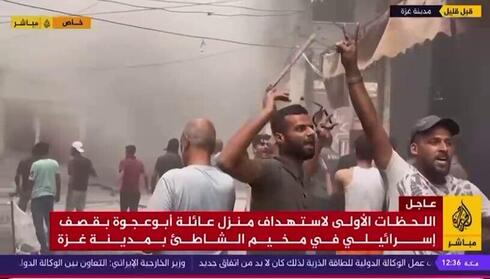By Einav Halabi, Lior Ben Ari, Yoav Zitun
Copyright ynetnews

The IDF struck Hezbollah targets deep inside Lebanon’s Beqaa Valley on Thursday, hitting weapons depots belonging to the Shiite terror group. The airstrike came as Hezbollah sits at the center of a storm in Beirut, where the Lebanese government is advancing a plan to dismantle the group’s arsenal and bring all weapons under state control. Meanwhile, Palestinian sources reported Israeli strikes in Gaza City’s built-up Shati refugee camp. Footage from the site showed civilians shouting, “We will not leave!” against a backdrop of smoke and rubble. According to reports, the strikes followed evacuation notices issued by the IDF and were carried out near the home of former Hamas politburo chief Ismail Haniyeh, who was assassinated in Tehran in July of last year. Local outlets spoke of a “widespread displacement” in the area. The IDF also dropped evacuation leaflets in Gaza’s Old City. Later, Palestinian outlets said the al-Mashharawi Tower, located near the Gaza Youth and Sports Ministry in Gaza City’s al-Nasr neighborhood, was bombed following advance warning. Earlier in the day, Lebanese media reported that a drone struck a motorcycle on the Ain Baal–Aytit road in southern Lebanon, killing a man identified as Waseem Jabaai. Other Lebanese outlets accused Israel of striking a building used as a school for children with special needs in the village of Aita al-Shaab, while further attacks were reported in the southern town of Ansar. In a statement, the IDF said the strike in the Beqaa Valley was carried out by air force aircraft and targeted facilities used for the production and storage of Hezbollah’s strategic weapons. The military added that it also struck Hezbollah positions in the town of al-Zrariya in southern Lebanon. “The presence of the terrorist infrastructure constitutes a violation of the understandings between Israel and Lebanon,” the statement read. The strikes came just days after the Lebanese government approved a phased plan to transfer all weapons to state control—a move that would in practice disarm Hezbollah. The government said it welcomed the plan and its next stages, but kept details of the military framework classified. Information Minister Paul Marcus said that “the Lebanese army will begin implementing the plan in accordance with available capabilities,” though he provided no clear timetable.



